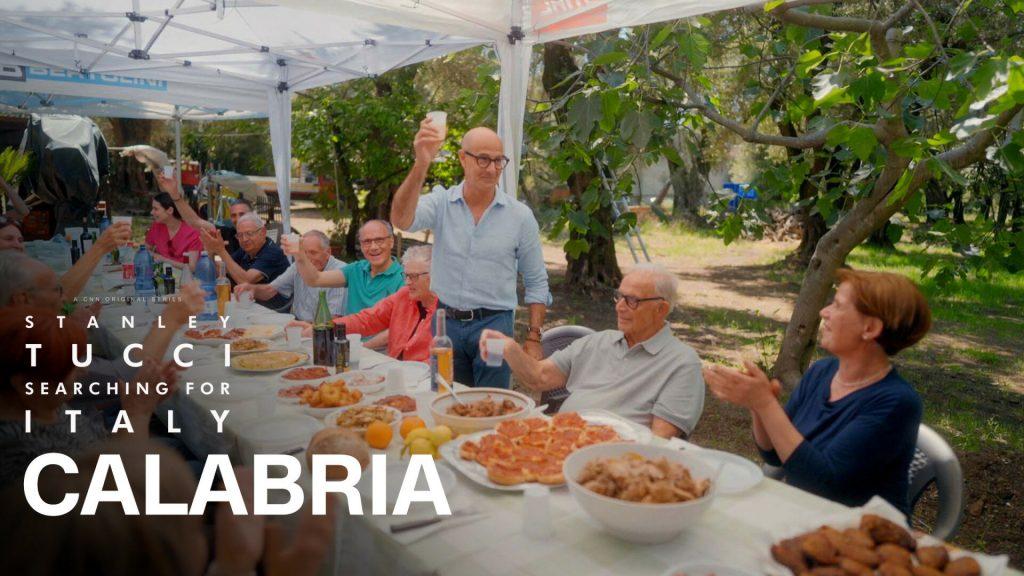Part Two of Season Two of CNN’s Searching for Italy began on Sunday, October 9th, the day before Columbus Day. And the first episode was auspicious: the series’ star and tour guide, actor Stanley Tucci, visited the ancestral region of both sets of his grandparents: Calabria, located in the toe-part in the visual heel of the boot.

Was the episode as firm as a piece of good soppressata (a food not mentioned in the hour-long special)? Or did it wither up like a Calabrian chili pepper left out in the sun? As with most of the series, it was somewhat in the middle. Dry.
The highlight of any show about Italy is always when former immigrants seek to reconnect with their roots to the homeland, no matter the history or circumstances. No exception here. The series began with Tucci, accompanied by his parents, Stanley (90 years old) and Joan (86 years old), walking through the Calabrian hill-town of Marzi, from whence much of the Tucci clan originated. Indeed, in a charming detail, the surname is seen practically everywhere, whether beneath doorbells or on street signs.
Ironically, although Tucci’s father does see his own father’s name listed in the local register, no relatives or deep connections emerge. Nonno Tucci left in 1904, sixteen years of age, and only returned once. This is contrasted, though, with a happier sequence at the end of the show: Tucci’s mother’s visits Tropeano and is greeted by a gaggle of her relatives. The show ends with everyone enjoying a meal outdoors Italian style, happily drinking wine under a canopy.
The familiar themes of ‘cucina povera’ (the cuisine of the poor) and foreign dominations of the land were predictably sounded. But Tucci does dive into some history for a change. He mentions the region’s 3,000-year-old history back to its being called Magna Graecia (Greater Greece), as an outpost of that collection of Hellenic city-states. He and his producers didn’t dive too deeply, however: they forgot to mention that Calabria was the first region of Italy to be known by the name Italia.
And though the foodstuffs were, of course, the main courses (the Tropea onion and local swordfish were highlighted), he could have garnished (groan) his insights even further by noting that Aspromante – which he visited – is just one of three amazing national parks in the region; that Calabria also boasts three well-known universities; that it has the two highest bridges in Italy; and that the poet Gabriele D’Annunzio called the coastline between Sicily and Reggio Calabria il piu bel chilometro d’Italia – the most beautiful kilometer in Italy.
None of these facts are unknown to many visitors to this website. The IIA’s chairman, Rosario Iaconis, is a proud Italian American of Calabrese heritage who has often waxed poetically (and accurately) about the region’s storied past.
Were you aware, for example, that Tommaso Campanello, a Dominican friar, philosopher, and poet, wrote “In Defense of Galileo Galilei” in 1616 while he himself was also imprisoned for heresy? That same spirit of speaking out can be seen in modern-day American celebrities of Calabrese heritage such as singer Tony Bennett (who, shocked by the anti-Black racism he witnessed during WWII, joined the U.S. civil rights movement) to actor-activist Mark Ruffalo (who routinely advocates for the poor, the oppressed, the environment, and for more open and honest government).
As if on cue, Tucci and his producers mentioned the N’drangheta, the local version of a mafia which has interfered with the region’s growth for decades. In a voiceover, Tucci called the N’drangheta “the most powerful criminal organization in the world which is estimated to gross $60 billion dollars a year.” Yes, that is worth repeating: “$60 billion dollars a year.” Sources, please!
If true, it begs two questions: a) how does a local criminal gang get so rich in “one of the poorest regions of Italy”? and b) with that kind of financial power, shouldn’t the N’drangheta be running Italy instead of the soon-to-be PM, Giorgia Meloni?
Tucci does repeat the phrase “Calabria is full of good people” more than once, perhaps out of guilt. And his comment about Calabria’s relationship to the water (“the sea is the mirror to the soul”) is a nice summary of the region’s special charm.
I conclude by pointing out that Travel and Leisure Magazine recently selected Calabria as one of the world’s most underrated destinations. And the region also got a boost thanks to an American named Lillian Meyers, an inveterate traveler who found herself in Calabria, fell in love with it (as well as with a local), and now has a YouTube channel called “Calabria Dreaming” which has garnered thousands of viewers. The link to an interview with her with IIA associate Frank DiPiero (Episode 92) on his podcast is below . -BDC




I do not remember Tucci mentioning British organized crime in the London episode. After all, the U.K. is the country with the highest consumption of cocaine in Europe. Someone has to distribute and sell it.
A most excellent point! The Kray Brothers (notorious Brit thugs) would thank you.
The American media is so besotted with the Brits, promoting them as a “superior people” (note the fawning coverage of Queen Elizabeth’s death), that the less-than-admirable habits of many of their citizens get very little attention.
Racist hooligans routinely turn soccer games into street brawls. Queen Elizabeth’s son Andrew, despite overwhelming evidence, was exonerated of any complicity via his associations with the sleazy American pervert Jeffrey Epstein. And, as you note, both street gangs and organized crime groups continue to reel in drug profits.
There is a new fictionalized cable TV series called Peeky Blinders which features a plethora of multi-cultural crooks wreaking havoc in England. Ever hear of it or watch it? Me neither. Unlike The Sopranos, this Brit crime show gets very little PR push.
It is not a coincidence.